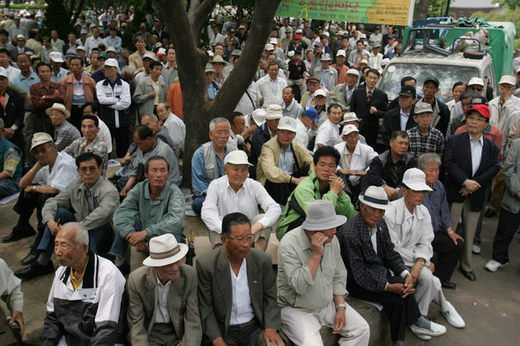 |
|
Crowds gathered to see the campaign of the May 31 regional elections
|
Hankyoreh survey shows GNP prevailing in major battlefields of Seoul and Gyeonggi
Research Plus, an independent research company, conducted a phone opinion poll on May 19-20 of voters in Seoul, Gwangju and Daejeon, as well as Gyeonggi and Jeju Provinces. The survey was conducted before Park Geun-hye, the representative of the main opposition Grand National Party (GNP), was attacked Saturday while on the campaign trail. According to the survey, performed on the request of The Hankyoreh, the GNP maintains a superior position in the Seoul and Gyeonggi areas, the Uri Party holds sway in Daejeon, and the Democratic Party (DP) in Gwangju. In Jeju, an independent candidate is leading. The opinion poll surveyed 2,900 voters, 700 each in Seoul and Gyeonggi areas and 500 each for the remaining areas. The results have a margin of sampling error of plus or minus 3.7 percentage points each for Seoul and Gyeonggi and 4.4 percentage points each for Gwangju, Daejeon and Jeju, as well as an overall confidence level of 95 percent.Seoul In Seoul, Oh Se-hun, GNP mayoral candidate, is still the only clear leader. Mr. Oh won 47.6 percent of the vote in the survey, compared to ruling Uri Party’s Kang Keum-sil, who got 22.6 percent. Among voters certain of their choice and who said they would definitely vote, Mr. Oh received 54.8 percent, compared with Mr. Kang’s 18.8 percent. In addition, Mr. Oh surpassed Mr. Kang in all age groups but those in their 30s. Among voters in their 20s (including those 19 years of age), Mr. Oh got 40.8 percent, compared with Mr. Kang’s 27.8 percent. Mr. Kang (37.4 percent) surpassed Mr. Oh (35.1 percent) by a narrow margin among voters in their 30s. Gyeonggi Province In the gubernatorial election of Gyeonggi Province, GNP lawmaker Kim Moon-su is leading. Mr. Kim got 36.4 percent of the vote, while Chin Dae-je of the governing party gained 17.7 percent. Among voters certain of their choice, Mr. Kim’s popularity is much higher at 46.3 percent, whereas that of Mr. Chin is 18.3 percent. Daejeon Yum Hong-chul of the Uri Party maintains a superior position here. In terms of overall political party popularity, the GNP (27.2 percent) holds slightly more ground than the Uri Party (24.8 percent), but in evaluation of individual candidates, Mr. Yum’s popularity stood at an overwhelming 43.6 percent, compared with GNP lawmaker Park Seong-hyo’s 9.0 percent. Nam Chung-hee of the People First Party (PFP) got merely 5.0 percent of the vote, meaning that his party’s influence in Daejeon is negligable. Jeju In Jeju, the GNP’s Hyeon Myeong-gwan (at 22.4 percent) is chasing Kim Tae-hwan (at 31.4 percent), an independent candidate. Jin Cheol-hun (12.6 percent) of the Uri Party is not expected to win the election. The GNP maintains that Mr. Hyeon will be able to overtake Mr. Kim at the last stage of the elections, but Mr. Kim said that the situation won’t change. Gwangju Cho Young-taek (17.2 percent), Uri’s mayoral candidate, lagged far behind his DP counterpart Park Gwang-tae, who got 38.4 percent. There was no significant gap by age and occupation among the vote distribution. Voters in their 40s, who generally lead public opinion, held a sharper difference between Mr. Cho and Mr. Park, at 10.6 percent and 38.9 percent, respectively. In terms of approval rating for political parties, the Uri Party stood at 19.4 percent, compared with the Democratic Party’s 32.2 percent.





